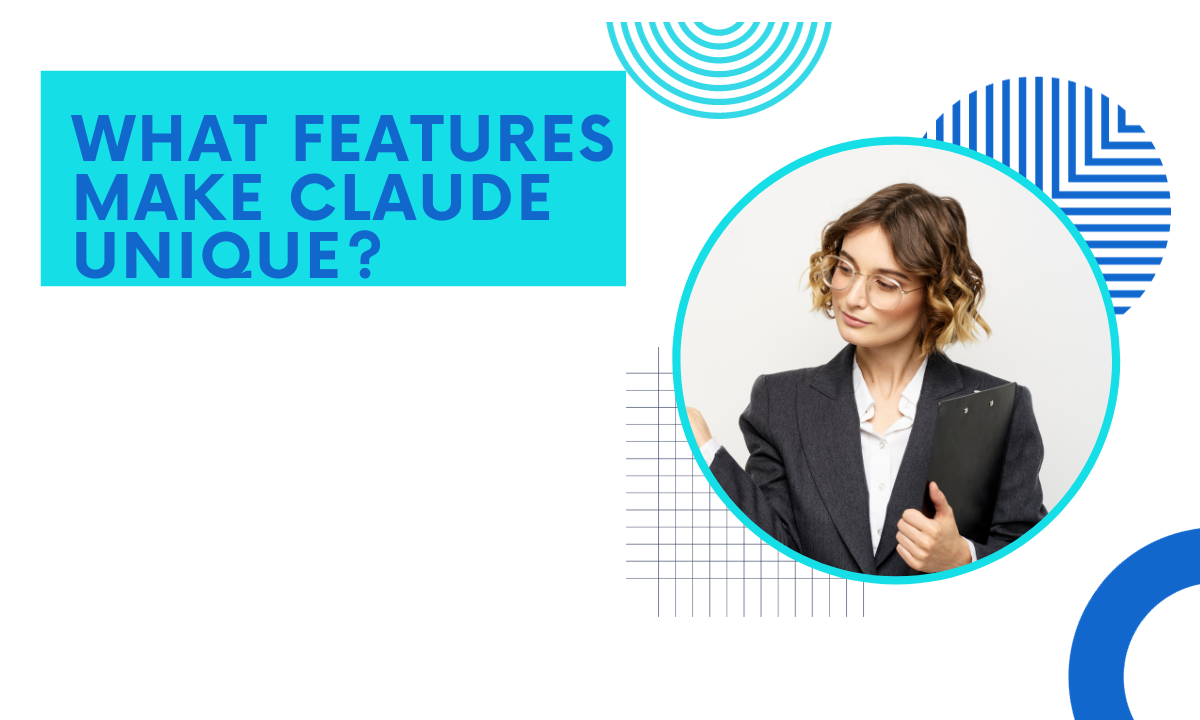What features make Claude’s unique?Here we’ll explore what makes Claude stand out from other AI agents and virtual assistants. We’ll examine Claude’s Constitutional AI foundations, safety capabilities, training methodology, user customization, oversight mechanisms and more.
Claude’s Constitutional AI Foundations
Claude is constructed using Anthropic’s Constitutional AI methods to prioritize safety, honesty, and beneficence. Constitutional AI aims to align AI systems to human values by baking principles into their architecture.
Some key Constitutional AI attributes embodied in Claude include:
Value Learning
Claude uses cooperative inverse reinforcement learning techniques to discern human preferences. This allows adapting Claude to individual users’ values while avoiding potentially dangerous optimization of arbitrary goals.
Uncertainty Awareness
Claude has introspective capabilities to recognize the boundaries of its knowledge. This prevents overconfidence that could lead Claude to provide harmful advice.
Honesty
Claude is designed to be honest about what it knows and doesn’t know. The system won’t pretend to have expertise outside its capabilities in order to avoid deceiving users.
Care & Judiciousness
Claude weighs the risks and benefits of potential actions, favors inaction when unsure, and escalates unfamiliar situations to humans. This judicious approach prevents unintended harm.
Transparency
Claude’s reasoning processes are designed to be inspectable and interpretable. Increased transparency builds user trust and allows identifying potential errors.
These Constitutional AI foundations aim to keep Claude aligned with human preferences and prevent uncontrolled optimization. Next we’ll explore how Claude applies safety techniques on top of its principles.
Claude’s Safety Capabilities
In addition to its Constitutional AI foundations, Claude incorporates state-of-the-art safety techniques to operate carefully within predefined domains:
Constitutional Curation
Claude’s training data and model capabilities are curated to harmless subjects like entertainment and productivity. Sensitive domains are constitutionally out-of-scope.
Capability Masking
Claude’s natural language generation capabilities are intentionally limited. Claude cannot write prose or engage in unsupervised dialog to prevent potential harms.
Adversarial Training
Claude’s models are adversarially trained to make them more robust to misleading inputs that could lead to dangerous responses.
Applied Ethics
An embedded ethics classifier provides real-time feedback on Claude’s responses to guide the system away from unethical output.
Oversight Integration
Claude is designed to facilitate ongoing human oversight and feedback to monitor for errors and make corrections.
These safety practices complement Claude’s Constitutional AI foundations to keep the system operating safely within a limited domain. Next we’ll explore Claude’s training methodology.
Claude’s Training Methodology
In contrast with some other conversational AI systems, Claude does not use large internet scraped datasets prone to toxicity or bias. Instead Claude is trained using Anthropic’s Constitutional data curation process designed to maximize safety.
Claude’s training data consists of high-quality conversation snippets generated by Anthropic contractorsroleplaying harmless scenarios. All data is subject to safety review before use.
This customized training dataset allows teaching Claude to be friendly, honest, and helpful without exposure to potentially dangerous content on the open internet. Training simulations also validated Claude’s safety behaviors before deployment.
Careful data curation and simulation-based validation enable developing Claude’s capabilities while upholding Constitutional AI principles. Next we’ll look at how users can customize Claude.
Customizing Claude to User Preferences
A unique aspect of Claude is its capability to adapt to individual users’ preferences and values using Constitutional AI techniques:
Interactive Preference Elicitation
When first using Claude, it asks questions to understand the user’s priorities and preferences to customize its conduct.
Ongoing Preference Feedback
Users can provide interactive feedback to Claude when they are satisfied or unsatisfied with its responses to continually align it to their values.
Conservatism
When unsure about a user’s preferences, Claude follows the cautious route of doing no harm over trying to optimize satisfaction.
Transparent Customization
Claude explains when its responses are adapted based on user feedback for full transparency.
This preference customization allows each Claude instance to hew closely to the values of the human it assists while avoiding unintended harm.
Ongoight and Corrigibility
To keep Claude honest and helpful, Anthropic employs human oversight teams that monitor and provide corrective feedback:
Human-in-the-Loop
Humans review a sample of Claude’s interactions to check for errors and provide retraining data when needed.
User Feedback Channels
Simple interfaces allow users to flag concerning responses to human reviewers in case intervention is required.
Version Tracking
Claude’s interactions are logged to trace problems back to specific versions for auditing and improvements.
Updatability
Claude’s models can be continually updated and refined based on oversight to prevent technical debt.
This human supervision complements Claude’s Constitutional AI foundations to ensure it operates safely even as capabilities grow.
Claude’s Benefits for Users
By incorporating the attributes above, Claude aims to provide users with a uniquely safe, beneficial AI assistant:
- Helpful for productivity, entertainment, and information needs
- Customizable to user preferences
- Transparent about its abilities and limitations
- Honest and non-manipulative in interactions
- Proactively avoids unethical, dangerous, or illegal conduct
- Learns responsibly from ongoing human oversight
- Safeguarded from open-ended optimization risks
These capabilities make Claude an promising exemplar of AI thoughtfully designed to improve human life.
Claude’s Benefits for Society
On a societal level, Claude also demonstrates approaches that could make future AI systems more trustworthy and reliable:
- Illustrates integrating ethics and oversight into AI products
- Proves unsafe behaviors can be avoided with the right architecture
- Shows value alignment doesn’t undermine usefulness
- Sets precedent that safety and market success can co-exist
- Provides publicly visible safety benchmarks for the AI community
- Gives policymakers concrete safety practices to potentially regulate
Claude represents a step towards aligned AI that respects human preferences while unlocking AI’s huge potential upside.
Development Roadmap
Claude is still an early stage product with much room for improvement. Anthropic’s roadmap highlights key next steps:
- Expand capabilities within harmless domains
- Increase robustness to edge cases
- Improve natural language processing skills
- Refine preference learning approaches
- Strengthen human oversight integration
- Iterate on transparency methods
- Gather user feedback to drive upgrades
Delivering a production-grade Constitutional AI assistant requires ongoing research, engineering, and user testing. Anthropic will apply learnings from Claude to improve future versions and new products.
Conclusion
Claude represents an intriguing case study in engineer AI systems that are helpful, harmless, and honest by design. Combining Constitutional principles, safety techniques, value alignment, and human oversight, Claude aims to be a one-of-a-kind AI assistant.
Much progress remains to be made both in Claude’s development and in AI safety generally. But Claude’s unique approach suggests pathways to developing AI that respects human preferences and acts only in beneficial ways we intend.
Companies like Anthropic blazing the trail on Constitutional AI may light the way towards advanced AI systems that empower humanity while protecting our values and interests. With thoughtful stewardship, the AI future may be brighter than some fear.

Frequently Asked Questions
Here are some common FAQs about Claude’s unique capabilities:
Q: How is Claude different from other AI assistants?
A: Claude prioritizes safety via Constitutional AI. It avoids scraping unsafe data, is transparent, aligns to user values, and has human oversight.
Q: Can Claude have everyday conversations like a human?
A: No, its capabilities are intentionally limited to harmless domains to avoid risks from open-ended dialog.
Q: What stops Claude from behaving in dangerous ways?
A: Its Constitutional AI foundations, safety techniques, training methodology, and human oversight keep it aligned and harmless.
Q: Does Claude use large language models like GPT-3?
A: No, Claude’s models are customized and constrained to prevent risks from open-ended optimization.
Q: How does Claude learn user preferences?
A: Through interactive elicitation, conservatism when unsure, and transparency when adapting to feedback.
Q: Can Claude be corrected if it makes a mistake?
A: Yes, oversight teams monitor Claude and provide corrective feedback to improve it over time.
Q: Does Claude have human-like consciousness?
A: No, Claude has no self-awareness or subjective experience. It is an AI assistant created to be helpful, harmless, and honest.
Q: What makes Claude transparent compared to other AI?
A: Claude explains its reasoning, capabilities, limitations, and when it adapts to feedback. Interpretability is architected in.
Q: Who oversees Claude’s operations?
A: Anthropic has teams of humans continuously monitoring, auditing, and providing corrective feedback to Claude as needed.
Q: What best practices from Claude could be adopted by the AI industry?
A: Constitutional risk avoidance, safety techniques, value alignment, and proactive human oversight.
Q: Does Claude have any limitations on its capabilities?
A: Yes, Claude’s skills are constitutionally limited to harmless domains. Sensitive capabilities like writing prose are intentionally unavailable.
Q: How does Claude decide what information to provide to users?
A: Claude has filters to avoid dangerous/unethical advice. It aims to offer useful information aligned with user preferences.
Q: Can Claude access the internet or real-time data sources?
A: Claude only accesses curated offline resources to prevent ingesting unsafe online content.
Q: Does Claude collect or store user data?
A: No, Claude’s interactions are ephemeral by design for user privacy and safety.
Q: How are Claude’s skills expanded safely over time?
A: Through rigorous testing and adversarial training focused on safety. No capacities are added without thorough risk analysis.
Q: Does Claude incorporate technical safeguards beyond its AI architecture?
A: Yes, it has security features like encryption, access controls, and monitoring to prevent unauthorized modifications.
Q: Can Claude explain how its responses relate to human values?
A: To an extent, via transparency features that trace Claude’s reasoning back to Constitutional principles and user preferences.
Q: How does Claude decide when a response could be unethical?
A: Via applied ethics classifiers trained on potential norm violations flagged by human reviewers.
Q: Does Claude have capabilities forcomplex multistep reasoning?
A: Currently minimal – Claude favors simple, limited responses over unpredictable multi-step inference.
Q: How does Claude suggest relevant responses without broad world knowledge?
A: Careful curation focusing Claude’s knowledge on its safe, approved domains rather than open-ended learning.

